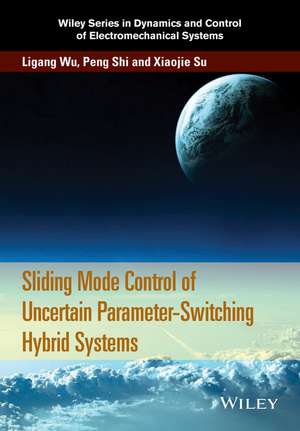Sliding Mode Control of Uncertain Parameter – Switching Hybrid Systems: Wiley Series in Dynamics and Control of Electromechanical Systems
Autor L Wuen Limba Engleză Hardback – 3 iul 2014
Preț: 623.71 lei
Preț vechi: 915.54 lei
-32% Nou
Puncte Express: 936
Preț estimativ în valută:
119.36€ • 124.46$ • 99.20£
119.36€ • 124.46$ • 99.20£
Carte indisponibilă temporar
Doresc să fiu notificat când acest titlu va fi disponibil:
Se trimite...
Preluare comenzi: 021 569.72.76
Specificații
ISBN-13: 9781118862599
ISBN-10: 1118862597
Pagini: 288
Dimensiuni: 173 x 248 x 20 mm
Greutate: 0.59 kg
Editura: Wiley
Seria Wiley Series in Dynamics and Control of Electromechanical Systems
Locul publicării:Chichester, United Kingdom
ISBN-10: 1118862597
Pagini: 288
Dimensiuni: 173 x 248 x 20 mm
Greutate: 0.59 kg
Editura: Wiley
Seria Wiley Series in Dynamics and Control of Electromechanical Systems
Locul publicării:Chichester, United Kingdom
Public țintă
Primary: Researchers and practitioners (Control and System Engineers) in control engineering.Secondary: Graduate students in control engineering, system sciences and applied mathematics. Computer scientists, mathematicians and physician working in control.
Cuprins
Notă biografică
Ligang Wu received the PhD degree in Control Theory and Control Engineering in 2006 from Harbin Institute of Technology, China. He was a Research Associate at Imperial College London, UK, and The University of Hong Kong, Hong Kong; a Senior Research Associate at City University of Hong Kong, Hong Kong. Now, he is a Professor of Control Science and Engineering at Harbin Institute of Technology, Harbin, China. Prof. Wu's current research interests include sliding mode control, switched hybrid systems, optimal control and filtering, aircraft control, and model reduction. Prof. Wu has been in the editorial board of a number of international journals, including IEEE Transactions on Automatic Control, IEEE Access, Information Sciences, Signal Processing, IET Control Theory and Applications, Circuits Systems and Signal Processing, Multidimensional Systems and Signal Processing, and Neurocomputing. He is also an Associate Editor for the Conference Editorial Board, IEEE Control Systems Society. Peng Shi received the PhD degree in Electrical Engineering from the University of Newcastle, Australia; the PhD degree in Mathematics from the University of South Australia; and the DSc degree from the University of Glamorgan, UK. He was a lecturer at the University of South Australia; a senior scientist in the Defence Science and Technology Organisation, Australia; and a professor at the University of Glamorgan, UK. Now, he is a professor at The University of Adelaide; and Victoria University, Australia. Prof. Shi's research interests include system and control theory, computational intelligence, and operational research. Prof. Shi is a Fellow of the Institution of Engineering and Technology, and a Fellow of the Institute of Mathematics and its Applications. He has been in the editorial board of a number of international journals, including IEEE Transactions on Automatic Control; Automatica; IEEE Transactions on Fuzzy Systems; IEEE Transactions on Cybernetics; and IEEE Transactions on Circuits and Systems-I. Xiaojie Su was born in Henan, China, in 1985. He received the B.E. degree in automation from Jiamusi University, Jiamusi, China, in 2008, the M.S. degree in Control Science and Engineering from Harbin Institute of Technology, Harbin, China, in 2010, and the PhD degree in Control Science and Engineering from Harbin Institute of Technology, Harbin, China, in 2013. Currently, he is a Professor of College of Automation at Chongqing University, Chongqing, China. His research interests include sliding mode control, robust filtering, T-S fuzzy systems, and model reduction. As a Guest Editor, he has organized two special issues in Mathematical Problems in Engineering and Abstract and Applied Analysis, respectively.
Descriere
In control theory, sliding mode control (SMC) is a nonlinear control method that alters the dynamics of a nonlinear system by application of a discontinuous control signal that forces the system to slide along a cross-section of the system's normal behaviour.





